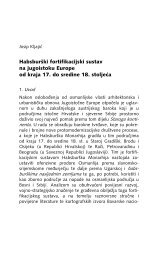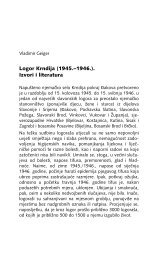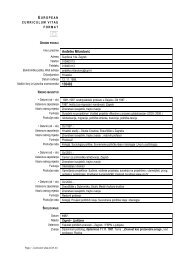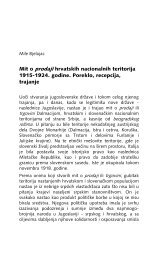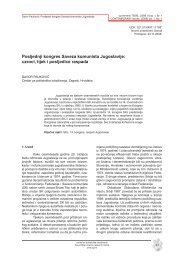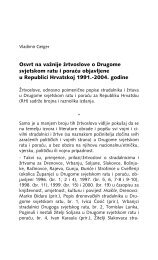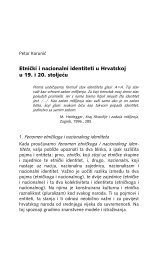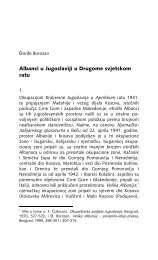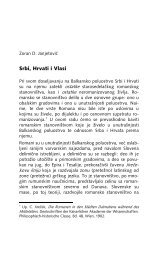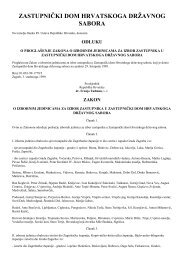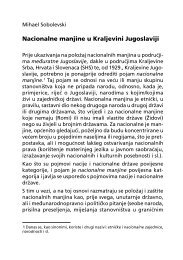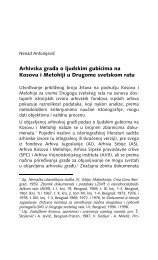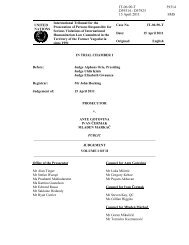ISSN 1847-2397 godište II broj 1 2009. | volume II number 1 2009
ISSN 1847-2397 godište II broj 1 2009. | volume II number 1 2009
ISSN 1847-2397 godište II broj 1 2009. | volume II number 1 2009
- No tags were found...
Create successful ePaper yourself
Turn your PDF publications into a flip-book with our unique Google optimized e-Paper software.
Plamena Pehlivanova: The Decline of Trust in Post-Communist Societiessuvremene TEME, (<strong><strong>2009</strong>.</strong>) God. 2, Br. 1CONTEMPORARY issues, (<strong>2009</strong>) Vol. 2, No. 1capital. For example, Clark studies the “risingmembership of cultural activity groups” in orderto emphasize the role of scenes in the post-materialistcountries. (Clark, Achterberg, Navarro2007: 11). The Netherlands witness the highestrise of membership, while Bulgaria, Russiaand China present a negative delta growth. Whydoes membership decline in Bulgaria and Russia,and how can we compare their outcomes tothe Chinese model?The studies and analysis of Clark,Achterberg and Navarro show that cultural participationin post-communist or communist countriesis decreasing (Table 3). They explain thisphenomenon as - participation in the post-communistcountries doesn’t lead to legitimacy. Onthe other hand, we should consider the idea thatsocial structures have lost their legitimacy on thegrounds of historical ineffectiveness and forcefulauthoritarian model. Furthermore, how doesChina compare to this model? We see in thetable above that Chinese participation in culturalorganisations is even lower than Bulgaria andRussia. In regards to the state economy, Bulgariareports the lowest economic growth betweenthe three countries, which could be correlatedwith the negative participation levels. On theother hand, China reports a GDP of $3.251 trillion(2007 est.) and at the same time witnessesthe lowest social association. What does this sayabout the Chinese model? The Chinese societyreports to be most concerned with materialistic,not post-materialistic values. Since the changeof the regime from legitimacy based on ideologyto legitimacy based on performance, theChinese society has witnessed increase in trusttoward the economic performance of the country,rather than the cultural/voluntary institutions.Students place a great deal of faith in the capacityof economic growth to solve their problems.While students agree that the environment is aserious problem, they place economic developmentbefore environmental protection in terms ofdomestic goals. (Stalley, Yang, 2006: 13) . Anotherexample becomes the environmental NGOs,which maintain only about 100 volunteers, ofwhich only 20 are considered regular contributors.Many Chinese environmental organisationsposses a degree of freedom, say Phillip Stalleyand Dongning Yang. Nevertheless, these philanthropicand environmental organisations remainclosely tied to the state and perform functionsin line with the central government policies. Thegovernment’s restrictions on NGOs and socialorganisations are argued by Peter Ho to havethis negative effect on participation (Ho, 2001).In general, the Chinese society remainsrestricted because of limitations in its political opportunitystructure – the lack of elections, the restrictionson social organisations and the lack ofcivil society. In addition, the Chinese society hasbeen focusing on the two most important domesticdevelopment goals – 1) promoting scientificadvancement and 2) controlling the population.So, environmental protection has been viewedas post-materialist issue and has been rankedbelow the government’s materialist goals. Thebelief in the “ideology of economic development”has hampered the likelihood of anti-pollutionmovement and the support in post-materialistissues. Therefore, the Chinese society can bedefined as materialistic and not yet issue-based,which partially explains its negative culturalparticipation levels. Here, the Chinese modelis similar to outcomes of Bulgaria and Russia;however the mechanism, which explains it turnsout to be very different. While the Bulgarian societyshows a decrease in cultural participationbecause of distrust and antagonistic behavioralpatterns, China’s negative delta membershipcomes from the government’s emphasis on theeconomic, rather than cultural, development.Another explanation to why there is adecline in voluntary and cultural organisationson the Balkans and Russia, given by PlamenGeorgiev in The Bulgarian Political Culture, isthat their society is less aware of the instrumentsof genuine democratic government; their mentalityis still set on the centralist model, like China(Georgiev, 2007:111). As previously noted byGallup International (2005), the President earns71% of the Bulgarian’s trust and the Army 55%,while the Parliament earns only 15%. Crosscompared internationally, the survey by the All-Russian Public Opinion Research Center (<strong>2009</strong>)found that trust levels for President Medvedev(Russia) have grown to 73 percent in the pastthree years. It is striking to see that both Bulgarianand Russian presidents have earned morethan 70 percent of their citizens’ trust, when atthe same time 22 percent of them express thatthe previous political regime was “Bad” (1999).However, the Gallup International presents a dualisticconcept. Does the survey actually test the“Trust in the President” or the “Trust in the Presidency”?Plamen Goergiev infers that the surveydefined rather dualistically by the concepts of“President” and “The Presidency” seems to benot less consistent (Georgiev, 2007: 112). Hepresents data for the levels of trust in differentpresidents: (1992) saw an 88% of the “blue”centar za politološka istraživanjathe political science research centrewww.cpi.hr38



